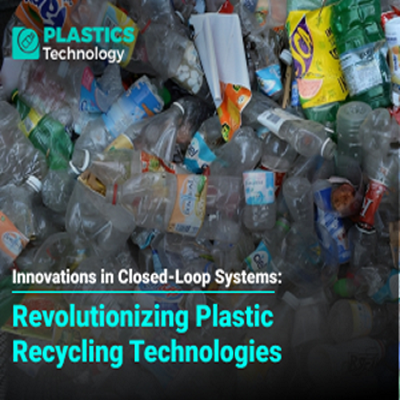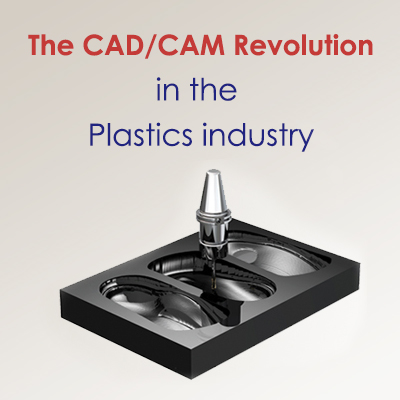Innovations in Closed-Loop Systems: Revolutionizing Plastic Recycling Technologies

Plastic's pervasive presence across diverse sectors, from packaging to electronics and healthcare to construction, underscores its central role in modern life. Regrettably, this prevalence has contributed to a dire global environmental crisis, as immense quantities of plastic waste inundate landfills, oceans, and ecosystems. Addressing this urgent issue has sparked a notable focus on recycling technologies, especially the advancement of closed-loop systems. These systems represent a groundbreaking approach to plastic recycling, providing sustainable solutions that not only mitigate the environmental repercussions of plastic waste but also foster a circular economy. Let's delve into the realm of plastic recycling technologies and examine the pioneering innovations propelling the evolution of closed-loop systems.
Understanding Closed-Loop Systems:
Closed-loop systems are designed to create a circular flow of resources by ensuring that products are reused, recycled, or repurposed at the end of their lifecycle. In the context of plastic recycling, a closed-loop system involves the collection, processing, and utilization of plastic waste to create new products or materials. Unlike traditional linear models where plastic is discarded after a single use, closed-loop systems aim to minimize waste and maximize resource efficiency. This not only reduces the strain on natural resources but also minimizes the harmful environmental impacts associated with plastic production and disposal.
| Read More: Closing the Loop: Advances in Plastic Recycling Technology |
Innovative Plastic Recycling Technologies:
1. Chemical Recycling: Innovative approaches to plastic recycling include chemical recycling, a pioneering technology that disassembles plastic waste into its primary chemical components. This process facilitates the creation of fresh plastic products possessing qualities akin to those derived from original materials. Chemical recycling surpasses the constraints of mechanical recycling, which frequently yields inferior materials. Corporations are progressively allocating resources to advanced chemical recycling methods, like pyrolysis and depolymerization, to tackle the complexities linked with plastic waste disposal.
| Also Read: How to Leverage Plastic Recycling Technologies for Environmental Protection? |
2. Biodegradable Plastics: Biodegradable plastics are gaining prominence as a sustainable alternative to conventional plastics. These innovative materials can be broken down by microorganisms into natural elements, such as water, carbon dioxide, and biomass, within a specified timeframe. With advancements in biotechnology, researchers have developed biodegradable plastics that maintain the durability and versatility of traditional plastics while ensuring environmental compatibility. By incorporating biodegradable plastics into closed-loop systems, industries can reduce the accumulation of non-biodegradable waste and promote the development of eco-friendly packaging and products.
3. 3D Printing with Recycled Plastics: The fusion of 3D printing and recycled plastics has unlocked fresh horizons for sustainable manufacturing. By employing recycled plastic filaments as the primary materials, 3D printing technology facilitates the production of intricate, personalized products, while significantly reducing environmental repercussions. This strategy not only streamlines the effective use of plastic waste but also fosters decentralized production, enabling localized and on-demand manufacturing. Consequently, the utilization of 3D printing with recycled plastics plays a pivotal role in advancing closed-loop systems, promoting resource efficiency, and curbing energy consumption.
4. Smart Sorting and Traceability Systems: The implementation of smart sorting and traceability systems has significantly enhanced the efficiency of plastic recycling processes. With the integration of advanced technologies, such as artificial intelligence (AI) and Internet of Things (IoT) devices, waste management facilities can accurately sort different types of plastics based on their chemical compositions and properties. Furthermore, traceability systems enable the tracking of recycled materials throughout the supply chain, ensuring transparency and accountability in closed-loop systems. These technological advancements not only streamline the recycling process but also encourage the responsible management of plastic waste, thereby fostering a more sustainable and accountable approach to resource utilization.
Challenges and Opportunities:
Despite the remarkable progress in plastic recycling technologies, several challenges persist in the widespread adoption of closed-loop systems. One of the primary obstacles is the lack of uniform recycling infrastructure, which hinders the efficient collection and processing of plastic waste. Additionally, the high costs associated with implementing advanced recycling technologies pose a barrier to their scalability and accessibility. Moreover, the limited awareness and consumer participation in recycling initiatives contribute to the inadequate segregation of plastic waste, further complicating the recycling process.
However, amidst these challenges, there exist significant opportunities for the development of closed-loop systems. Collaborative efforts between governments, industries, and communities can foster the establishment of a comprehensive recycling infrastructure and incentivize sustainable practices. Furthermore, the integration of circular economy principles into policy frameworks can encourage the adoption of closed-loop systems, promoting resource conservation and waste reduction. Education and awareness campaigns focusing on the importance of responsible plastic disposal can also play a crucial role in cultivating a culture of environmental consciousness and sustainable consumption.
The Road Ahead:
Plastic recycling technologies continue to evolve, driven by the imperative need to mitigate the environmental impact of plastic waste and foster sustainable development. As the world grapples with the consequences of excessive plastic consumption, the implementation of closed-loop systems represents a pivotal step toward achieving a more circular and resource-efficient economy. By embracing innovative solutions and fostering a collective commitment to sustainability, we can pave the way for a future where plastic waste is no longer a threat to our planet but a valuable resource that fuels a thriving circular ecosystem.
In conclusion, the advancements in plastic recycling technologies, particularly in the realm of closed-loop systems, are instrumental in reshaping the way we perceive and manage plastic waste. Through the integration of innovative processes and the promotion of sustainable practices, we can redefine the lifecycle of plastics, transitioning from a linear model of consumption to a circular model of resource utilization. By harnessing the potential of closed-loop systems, we can not only mitigate the environmental consequences of plastic pollution but also foster a more resilient and eco-conscious society, one that prioritizes the preservation of our planet for generations to come.
By prioritizing collaborative efforts, technological advancements, and proactive policy interventions, the journey toward a sustainable future can be accelerated. Embracing the principles of circular economy and promoting responsible consumption practices are pivotal in ensuring that plastic recycling technologies continue to drive positive environmental change and foster a greener, healthier planet for all.



